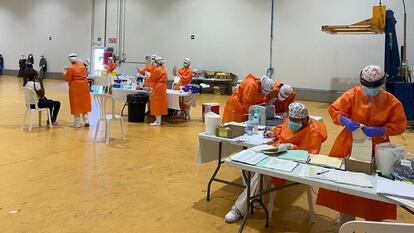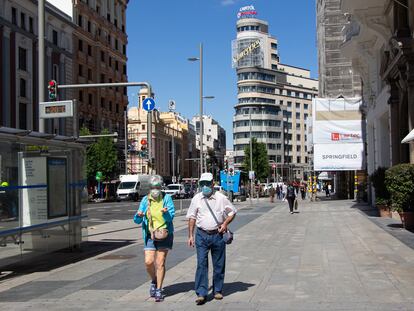New coronavirus outbreaks force first area in Spain to move back to a previous deescalation stage
Around 67,700 residents of Aragón were placed in Phase 2 of the government's plan on Monday, just a day after the entire country entered what has been dubbed the ‘new normality’


A day after Spain entered the “new normality” following a prolonged coronavirus deescalation process, a small area in the northeast of the country took several steps back due to fresh outbreaks of the virus.
The 67,700 residents of three comarcas – administrative divisions smaller than a province – in the region of Aragón are back in Phase 2 of Spain’s deescalation plan after having moved through a four-stage process out of one of the world’s strictest confinements.
This is the first area to reintroduce restrictions after Spain on Sunday fully lifted a lockdown that was introduced in mid-March to curb the spread of virus. Spain has been one of the world’s hardest-hit countries by the coronavirus pandemic, with an official death toll of 28,323 although excess deaths during the period number over 43,000.
This outbreak is quantitatively relevant, and qualitatively very important because if we do not address it, we run the risk of losing control over community transmissionFrancisco Javier Falo, Aragón's director general of Public Health
Spain’s Health Minister, Salvador Illa, said that the situation in Aragón is being closely monitored and that the outbreak “is on its way to being under control.” Illa added that the 11 or so other outbreaks detected so far in Spain – including those in Madrid, Catalonia and the Canary Islands – are contained, and that the ministry has greatest concerns over the one in Aragón.
The restrictions affect the comarcas of Cinca Medio, Bajo Cinca and La Litera, located in Huesca province, near the border with the Catalan province of Lleida.
The decision was made after several coronavirus outbreaks were detected in the municipalities of Binéfar, Zaidín, Fraga and Monzón. The infections were mostly located among fruit pickers working in the area, although a few were also detected in family environments. A fruit and vegetable company in Zaidín has been closed after 14 cases were detected there. Some of its workers live outside the municipality and spread the virus in their places of residence.
The director general for public health in Aragón, Francisco Javier Falo, said that the outbreaks have been detected among young people with no or few symptoms of the disease. But he urged people not to take it lightly: “This outbreak is quantitatively relevant, and qualitatively very important because if we do not address it, we run the risk of losing control over community transmission.”
No checks on mobility
Phase 2 means, among other things, that food and drink venues as well as retail stores can only operate at 40% capacity, while this figure is raised to 50% for places of worship. Nightclubs and children’s playgrounds must remain closed, and swimming pools can only open at a third of capacity.
Authorities cannot reintroduce widespread restriction of movement, as this could only be done while Spain was under a state of alarm. These emergency powers expired on Sunday. The regional government of Aragón has instead urged citizens to limit their trips to and from these areas, and warned that if the situation gets worse, it could ask the central government for help introducing more restrictive measures. A public health law can be used to confine a small area such as a municipality, for example, without the need for the state of alarm, but this needs the approval of the central government.
“If epidemiological conditions should force us to take more drastic measures in terms of limiting mobility, we would turn to the state, who would arbitrate the relevant measures to make it possible to demand such limits [on movement],” said the regional health chief, Sira Repollés.
There are around 50 known cases so far, and authorities are expecting to see a significant rise in diagnoses in the coming hours. “On June 18 we reported two cases in Huesca, on June 19 it was 19 cases, it was 10 cases the following day, and yesterday there were 25,” said Falo.
English version by Susana Urra.
Tu suscripción se está usando en otro dispositivo
¿Quieres añadir otro usuario a tu suscripción?
Si continúas leyendo en este dispositivo, no se podrá leer en el otro.
FlechaTu suscripción se está usando en otro dispositivo y solo puedes acceder a EL PAÍS desde un dispositivo a la vez.
Si quieres compartir tu cuenta, cambia tu suscripción a la modalidad Premium, así podrás añadir otro usuario. Cada uno accederá con su propia cuenta de email, lo que os permitirá personalizar vuestra experiencia en EL PAÍS.
En el caso de no saber quién está usando tu cuenta, te recomendamos cambiar tu contraseña aquí.
Si decides continuar compartiendo tu cuenta, este mensaje se mostrará en tu dispositivo y en el de la otra persona que está usando tu cuenta de forma indefinida, afectando a tu experiencia de lectura. Puedes consultar aquí los términos y condiciones de la suscripción digital.








































